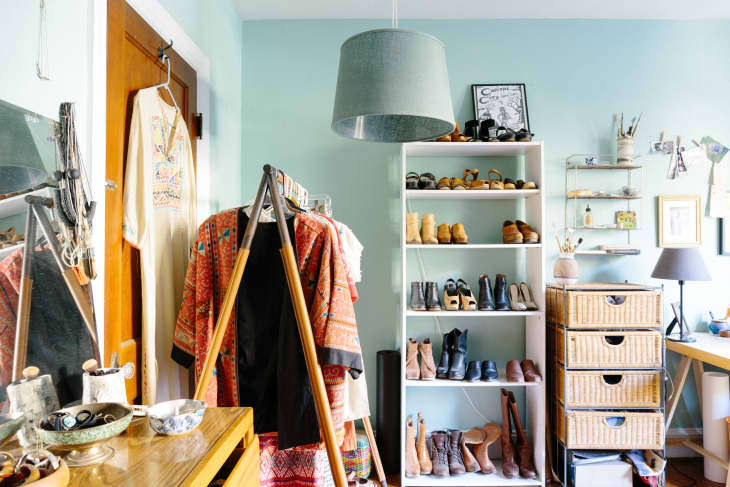4 Organizing Habits to Ditch in 2022 (and 4 to Start), According to Pro Organizers

Now Trending is our one-stop spot to get ahead of all of the biggest things for 2022 — before everyone else knows about them. From the surprising color that’s taking over kitchens to the TikTokers you need to follow and so much more, check out all of the top trends of 2022 here.
Now Trending is created independently by our editorial team and generously underwritten by Target.
The start of a new year is a great time to get organized, whether that means clarifying your goals or a more literal decluttering of your physical space. The two go hand in hand: Creating organization-specific goals can help you develop routines that’ll keep your space tidy for the long haul — and a decluttered space can serve your larger goals by freeing up your mental energy to focus on what matters most to you.
So this year, why not take stock of your organization habits and create new ones that improve your home and your life? If you’re not sure where to start, we’ve got you covered. Here are four organizing habits pro organizers think you should ditch in 2022, and four new ones to kickstart.
Stop Overbuying Organizing Products
It might look pretty, but does that basket or bin solve a specific problem in your home? Does it truly match your lifestyle and aesthetic? If not, U.K.-based pro organizer Isabel Almeida suggests leaving it on the shelf. “Less is more in organizing, and having containers that feel like a hassle to maintain can set your organization back rather than pushing it forward,” she says.
Stop Buying Containers Before You Declutter
There will likely come a time when you’ll need a container to corral your clutter, but hold off on buying these tools until you actually declutter your things. According to Shannon Krause, co-founder of Tidy Nest, it’s best to edit your belongings first, then buy the containment you need. You’ll not only save money and prevent future clutter, but you’ll have a sense of exactly what you need when you shop for supplies.
Stop Decanting into Clear, Unlabeled Containers
London-based organizer Brenda Scott, says as aesthetically pleasing as those clear decanting jars look, they could pose an inconvenience or risk to you later on. First, if you toss a food item’s original container, you won’t know the ingredients, how to safely handle the product, the best before date, or the lot number, in case you want to file a complaint. Sunlight that filters through clear containers might also compromise the quality of whatever you put in them.
Stop Trying to Organize Your Whole Space at Once
It’s tempting to declutter and organize your whole space when you feel motivated, but Scott says it’s best not to start what you can’t finish as you may start to associate the organizing process with stress or anxiety. “It may work for someone with a studio or a one- or two-bedroom apartment, but when it comes to a whole modern family home, it just isn’t realistic,” she says. Instead, break the home up into sections, and start with the section that aggravates you the most (say, your kitchen or bathroom). “This technique allows the client to see the improvement and gives them the assurance that it can be done,” says Scott.
Start Researching Before You Declutter
Organization should be sustainable, both for you and the planet. So before you go on a decluttering spree, do your research about where your unwanted or unneeded items will end up. Can you recycle, donate, or sell them? If you plan to donate or sell, which organizations will make the best use of your belongings? Will the local thrift store just throw away your stained old clothes? All this information, Almeida says, can empower you to make the most environmentally conscious decisions — even if it means a little more research on the front end. Knowing where your stuff may end up, she says, can also equip you to make better decisions about what you buy later on.
Start Shopping at Home Before You Buy
Another mindful consumption tip is to consider what you may already have at home before you buy something brand new. “There’s a chance you already have it and just forgot you already own it, or you have something you can substitute,” says pro organizer Jamie Novak. “Either way, shopping from home first is a great way to declutter while saving money.
Start Putting Things Away Right After You Use Them
Organization is a long game—it only works if you follow the systems you created. One way to maintain your systems? “Get into the habit of putting things away in their correct place, right away,” says pro organizer Michelle Hansen. “Clutter is just a form of delayed decisions, so if you can take a couple of extra minutes to put things away where they need to go, it will really cut down on the clutter that accumulates.”
Start Seeing Organization as a Lifestyle, Not a Task
There might be a lot of tasks involved in getting organized, but at its core, organization is a frame of mind. You organize so you can live more fully in other areas of your life, and that means it’s not just about your closet or your shelves. This year, Novak suggests incorporating clearing mental clutter, too. Rearrange your schedule to better reflect your values, keep your finances in order by creating a budget that helps you meet your goals, and maintain organization on your phone and computer by deleting apps, photos, and other space-hogging stuff you don’t use. As you declutter other areas of your life, you’ll find yourself with more capacity to do things that matter most to you.